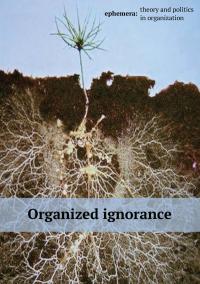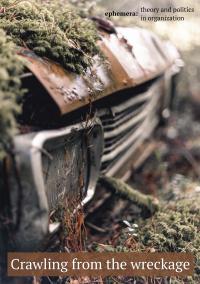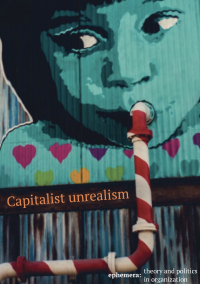‘Saving the city’: Collective low-budget organizing and urban practice
| Attachment | Size |
|---|---|
| CfPSavingTheCity_.pdf | 133.97 KB |
Issue Editors: Paula Bialski, Heike Derwanz, Lena Olaison, Birke Otto, Hans Vollmer
In times of financial and economic crisis, cities have become sites of austerity measures, permanent fiscal restraint, declining tax revenues, bankruptcies and ever-increasing cuts to public services. In order to ‘save the city’, Jamie Peck argues that the imperative to ‘cut back and save’ and ‘work your way out of debt’ results in urban policies such as structural adjustment, privatization, public-private partnerships, and welfare retrenchments (Peck, 2012; see also Peck et al., 2009). While existing institutional arrangements, collectivist, social-state based ideals and redistributive systems are diminishing, there has been a proliferation of collectively organized urban practices.
In light of these developments, urban dwellers are working creatively with urban scarcity to develop new forms of organizing the city parallel and/or in contrast to centralized, state-based infrastructure, and are forced to do so with a low budget (Low-Budget Urbanity, 2013). These include collectively organized urban survival strategies such as car sharing as opposed to car ownership; travelling using online hospitality networks (e.g. CouchSurfing) instead of hotel accommodation (Bialski, 2012; Rosen et. al., 2011); second-hand shopping, cloth swapping and ‘dumpster diving’ versus mass consumption and throwaway culture (Gregson and Crewe, 2003); or DIY-building rather than ready-made (Brodersen, 2003; Drotschmann, 2010). Other examples include urban farming and cooperative gardening (Schmelzkopf, 1995); local currency systems (Hughes, 2005); transport ticket sharing, house squatting (Neuwirth, 2005); up-cycling of sewage and trash, and other forms of re-using and re-valuing urban resources. As the city is made up of multiple forms of organizing, forming an alternative, low-budget solution often means moving away from the more centralized and top-down forms of urban organization into the decentralized and local.
These self-organized, collective saving practices all involve ‘complex encounters, connections and mixtures of diverse hybrid networks of humans and animals, objects and information, commodities and waste’ (Sheller and Urry, 2006: 2). Here cultures of frugality and sharing (Botsman and Rogers, 2010; Doherty and Etzioni, 2003) emerge, creating new economic forms that have long-term effects on the urban space. Their emergence poses new questions regarding the relation of these practices to capital, the state, and citizen responsibilities of citizen. For example, how do long-term self-organized projects alleviate and replace the responsibility of state-run systems in favor of the entrepreneurial urbanism (Harvey, 1989) and what are its effect in terms of gentrification processes, splintering urbanism and the loss of urban commonalities (Graham and Marvin, 2001; Harvey, 2012; Brenner et al., 2012)?
While these practices transform the urban setting, the motivations as to why people and communities deploy new forms of budget organizing are not so clear-cut. Such practices are an expression of a lack of material means and imposed abstinence (Oswalt, 2005; Bude et al., 2011), but also manifestations of conscious decisions to save money and resources. Quite simply, these practices can occur out of necessity and/or choice. What these activities have in common is that they bring on a new awareness of scarcity, low-cost and local production, they produce new forms of value, other measures of calculating, smaller cycles of exchange and coordination and collective organization under the principle of frugal living. Such saving practices engage actors in bottom-up, improvised, flexible, local organization (Pacione, 1997) that creates solidarity and new forms of urban cooperation. To what extent are these practices strictly a middle-class phenomenon, and at what levels of the urban do they force urban dwellers into underground and illegal economies (Venkatesh, 2006; Sharff, 1987)?
This ephemera Special Issue asks what new forms of urbanity are produced through the interplay with or under the impression of austerity policies that we can observe all over Europe and the US. Here, we are less interested in the analysis of top-down policies and city governance, but ask how living in the city continues under these circumstances? What new urban forms of organizing emerge based on everyday practices of saving in the city? How are daily living conditions affected by austerity urbanism and what are the self-organized and cooperative practices that people develop in such circumstances? What are systems of reciprocity and redistribution build in this age of austerity? What are the responsibilities of citizens to the city they live in (Massey, 2004)? What are bottom-up progressive politics, networking initiatives? What are alternative urbanities?
To this end, we ask for contributions, from both a theoretical and an empirical perspective, that critically analyze the practices, objects, discourses and histories that inform notions of ‘low-budget urbanity’. We welcome contributions from within the broad study of urban, collective organization – e.g. from management and organization studies, human geography, urban studies, urban theory, city planning, social anthropology, sociology, accounting, political theory – with an emphasis on the material and social economy of frugal urban practice. Possible topics include, but are not limited to the following:
- Anthropological perspective on everyday practices of saving in the city
- Calculating a low-budget to survive in the city
- How new practices emerge out of political struggles (e.g. reclaim the streets, squatting, collective gardening)
- Collective organization, collective entrepreneurship
- New practices that help trace the historical trajectories of low-budget urban life
- The way people perform a budget and the materialities that surround this performance
- The networks and communities that create an alternative urbanity
- Politics of saving money
- Alternative forms of collective organizing in the city
- Sharing and exchange
- Thrift, frugality, conscious saving
- Recycling, up-cycling
- Low-resource urbanities
Deadline for submissions: 1 October 2013
All contributions should be submitted to one of the issue editors: Paula Bialski, Heike Derwanz, Birke Otto, Lena Olaison, Hans Vollmer. Please note that three categories of contributions are invited for the special issue: articles, notes, and reviews. All submissions should follow ephemera’s submissions guidelines. Articles will undergo a double blind review process. Please do not hesitate to contact one of the editors with any queries you might have, or to propose a note or review contribution.
References
Bialski, P. (2012) Becoming intimately mobile. Warsaw studies in culture and society. Warsaw: Peter Lang.
Brenner, N., P. Marcuse and M. Mayer, (2012) Cities for people, not for profit: Critical urban theory and the right to the city. London: Routledge.
Botsman, R. and R. Rogers (2010) What’s mine is yours: The rise of collaborative consumption. New York: HarperBusiness.
Brodersen, S. (2003) Do-it-yourself work in North-Western Europe. Copenhagen: Rockwool Foundation.
Bude, H., T. Medicus and A. Willisch (2011) ÜberLeben im Umbruch: Am Beispiel Wittenberge: Ansichten einer fragmentierten Gesellschaft. Hamburg: Hamburger Edition.
Doherty, D. and A. Etzioni (2003) Voluntary simplicity: Responding to consumer culture. Oxford: Rowman and Littlefield.
Drotschmann, M. (2010) ‘Baumarkt 2.0. Do-it-yourself, Youtube und die Digital Natives’, Journal of New Frontiers in Spatial Concepts, 2: 18-27.
Graham, S. and S. Marvin (2001) Splintering urbanism: Networked infrastructures, technological mobilities and the urban condition. London: New York: Routledge.
Gregson N. and L. Crewe (2003) Second-hand cultures. Oxford: Berg.
Harvey, D. (1989) ‘From managerialism to entrepreneurialism: The transformation in urban governance in late capitalism’, Geografiska Annaler, 71(1): 3-17.
Harvey, D. (2012) Rebel cities. London: Verso.
Hughes, A. (2005) ‘Geographies of exchange and circulation: Alternative trading spaces’, Progress in Human Geography, 29(4): 496-504.
Low-Budget Urbanity (2013), Low-Budget Urbanity. On Urban Tranformation in Times of Austerity, Research Initiative at HafenCity University Hamburg, www.low-budget-urbanity.de, Accessed 10.5.2013.
Massey, D. (2004) ‘Geographies of responsibility’, Geografiska Annaller, 86(1): 5-18.
Neuwirth, R. (2005) Shadow cities: A billion squatters, a new urban world. New York: Routledge.
Oswalt, P. (2005) Schrumpfende Städte. Band 1: Internationale Untersuchung. Ostfildern-Ruit.
Pacione, M. (1997) ‘Local exchange trading systems as a response to the globalisation of capitalism’. Urban Studies, 34: 1179-1210.
Peck, J. (2012) ‘Austerity urbanism’, City, 16(6): 626-655.
Peck, J., N. Theodore and N. Brenner (2009) ‘Neoliberal urbanism: Models, moments, and mutations’, SAIS Review, 29(1): 49-66.
Rosen, D., P. R. Lafontaine and B. Hendrickson (2011) ‘Couchsurfing: Belonging and trust in a globally cooperative online social network’, New Media & Society, 13(6): 981-998.
Schmelzkopf, K. (1995) ‘Urban community gardens as contested space’, Geographical Review, 85(3): 364-381.
Sharff, J. (1987) ‘The underground economy of a poor neighborhood’, in L. Mullings (ed.) Cities of the United States: Studies in urban anthropology. New York: Columbia University Press.
Sheller, M. and J. Urry (2006) Mobile technologies of the city. New York: Taylor & Francis.
Venkatesh, S. A. (2006) Off the books: The underground economy of the urban poor. Chicago: Harvard University Press.




